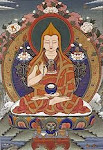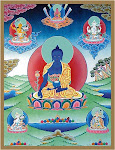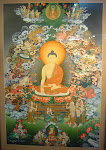 If you can find a reason for why you're feeling depressed, you can try to use that situation or those conditions as the basis for meditation to overcome the depression. But if you can find no obvious reason, the best thing you can do is to use your depression to develop bodhicitta.
If you can find a reason for why you're feeling depressed, you can try to use that situation or those conditions as the basis for meditation to overcome the depression. But if you can find no obvious reason, the best thing you can do is to use your depression to develop bodhicitta.
For example, in the Guru Puja there's a verse that reads,
"Please bless me to realize that the chronic disease of self-cherishing, the thought cherishing the I, is the cause of all my undesired sufferings and to destroy this great demon of self-cherishing by blaming and harboring a grudge against it."
Recite this, and also the next verse, which reads,
"Please bless me to see that cherishing all mother sentient beings and wanting to lead them to bliss is the door to infinite good qualities and to cherish them more than my life, even should they rise up as enemies against me."
It is very, very good to recite these verses in daily life in general and when you're feeling depressed in particular. Use your depression to practice the meaning of these two verses.
As the Guru Puja says, cherishing the I is the door to all suffering and problems. Since all the problems and obstacles to happiness you encounter come from cherishing your I-in other words, from your I itself-you should renounce your I forever; give it up completely. And since all happiness comes from bodhicitta, cherishing others, every good thing, every happiness, including enlightenment, comes from others. Therefore, sentient beings are all that you should ever cherish.
Furthermore, since every happiness and perfection, including all realizations up to enlightenment, comes from other sentient beings, you have to repay their kindness; you have to help them.
Giving sentient beings wealth is not the best way of repaying their kindness. They have all been billionaires, even wheel-turning kings owning entire universes, in previous lives, but despite having had all those riches numberless times, they are still not free from the suffering of samsara. Giving them wealth is not the best way to repay their kindness.
The best way to help others is to direct your mind towards Dharma, to practice lam-rim. To transform your mind from ignorance, ego and attachment to samsara into the positive, pure thoughts of the path to enlightenment. By actualizing the realizations of the path yourself, you can liberate others from suffering without much difficulty. By trying to develop bodhicitta, you can make your life worthwhile in the best possible way.
Thinking of all these reasons, especially that the best way to repay the kindness of others is to develop bodhicitta, try to develop the mind that cherishes others. On the basis of compassion, take the suffering of others into your own mind, into your heart. Absorb their suffering into your ego and destroy it; make your ego completely non-existent. After your ego has become non-existent, remain for a minute or so in meditation on emptiness.
Then, on the basis of loving kindness, give your own happiness and merit, all good things, to all sentient beings. When you do the meditation of offering other sentient beings your body, wealth, merit and everything else, you create unbelievable merit. Visualize that all sentient beings receive everything they need-whatever they want according to their point of view.
Of course, sentient beings are confused; they don't actually know what they need. What they really need is Dharma, but if they don't know about Dharma they won't think that they need it. They'll think they want something else. However, visualize that those who need a guru meet a guru and so forth. By receiving all these enjoyments, whatever they need, they actualize the spiritual path, cease the two obscurations, gross and subtle, their mind becomes enlightened and their body becomes rupakaya.
Conclude the meditation by thinking, "How wonderful! Since beginningless time I have been dying working for my own happiness and so far, nothing worthwhile has happened; I'm still in samsara. I have never died working for others; that would be extremely worthwhile."
When you generate compassion, take on all sentient beings' suffering and its cause, delusion and karma-not only their negative thoughts and problems, but also their ugly, unhealthy, polluted places. For example, unpeaceful places like those of the hell beings, where the red hot ground runs with molten lava or where the environment is unbearable cold, solid ice, or even unpleasant human environments, places that are dirty, filthy, rough, muddy and covered with thorns. Take even sentient beings' horrible environments onto your ego and self-cherishing thought and destroy these negative minds completely.
Think, "I have died numberless times working for my own good, but now I can die working for others. How fantastic."
Think that since every sentient being is the source of all your past, present and future happiness, it is really important to experience your depression on behalf of all sentient beings. In other words, think that the depression you're experiencing is not your depression but that of all sentient beings, and that by taking it on you're allowing numberless other sentient beings experience all happiness, especially liberation from samsara and the highest enlightenment. Think, "How fantastic this is. This is incredibly joyful."
Think, "Even Buddha, Dharma and Sangha, who allow me to purify my negative karma, actualize all realizations and achieve enlightenment, came from sentient beings. Therefore, sentient beings are the most precious thing in my life. Since all my past, present and future happiness come from sentient beings, there's nothing other than sentient beings to cherish. In my life, there's nobody else to work for than sentient beings; working for anything else is totally meaningless."
Experience your depression for others.
Or you can think, "In the past-for example, when I have made the prayers from Guru Puja, like those above-I have prayed for the sufferings of others to ripen on me. At last my prayers have been answered and the depression of others is ripening on me. Working for others in this way is the most exciting, pleasurable thing in my life, especially my experiencing their suffering and allowing them to have all freedom and happiness." Rejoice that you have the opportunity to experience others' suffering.
You should practice tong-len, this meditation of taking and giving, every morning and evening, but anyway, most of the time you should be thinking, "How lucky, how fortunate I am to be experiencing the depression that I have prayed so long to receive. How fantastic this is!" This makes your life rich, meaningful and fulfilling. "How fortunate I am to be experiencing depression on behalf of, for the benefit of all sentient beings." While you are experiencing sickness, think how fortunate you are to be taking it on, experiencing it, on behalf of all sentient beings.
Thinking like this makes a huge difference to your life; it's the best possible psychology. Much of the pain we feel is exaggerated by conceptualization. Similarly, we can diminish or eradicate our experiences of pain by our own minds.
After meditating on the extensive kindness of sentient beings, how all your past, present and future happiness is due to them, think, "The real purpose of my life is not just to have a long life and good health, wealth, power, reputation or many people around me."
For example, if you don't have a good heart, even should you live for a thousand years, your life will have been meaningless. Eons of perfect health is useless if there's no benefit for others. Similarly, wealth, power, reputation and entourage are empty if they're not used for the benefit of others. None of those things gives meaning to your life. Irrespective of what happens to you-sickness or health, depression or no depression-if you make it beneficial for others, at that time, your life has meaning; you are fulfilling its purpose.
Even if you have cancer, if you make that experience beneficial for all sentient beings by using it to develop bodhicitta and achieve other realizations of the path, it actually becomes the cause of happiness. It's like using snake venom to make antivenin, which protects you from the dangers of snake bite. You are using your depression or cancer to achieve enlightenment. Thus, it becomes the cause of happiness of all sentient beings.
The main purpose of your life is to be beneficial for other sentient beings-to free them from suffering and bring them all happiness. Not just the happiness of this life but the happiness of lives into the far distant future. Therefore, even if you are depressed, you must make it useful; it must become the cause of happiness for all sentient beings. You have to experience it on behalf of all sentient beings and use it to develop bodhicitta. In this way, your depression can become a quick means of achieving enlightenment. It's the same if you have cancer-use it as a quick path to enlightenment. If you experience illness for the benefit of other sentient beings, it's an incredible purification and quickly brings you to enlightenment.
Once, an ancient Heruka yogi called Ngagpa Chöpawa was on his way to Odi, in West Bengal, to practice the final stages of tantra. He came to a river, where he encountered a woman suffering from advanced leprosy, her body covered in sores, pus and blood. She asked him to help her cross the river but he ignored her and went on his way. A bit later his disciple, Getsul Tsimbulwa, came along. As soon as he saw this woman he was overcome with compassion. Without hesitation or any thoughts of how dirty she was, that he might catch leprosy or that he was a monk and shouldn't touch women, he put her on his back and started across the river. He just felt unbearable compassion and wanted to do whatever he could to help her.
When they reached the middle of the river, all of a sudden she transformed into Vajrayogini, and then and there, took him to her pure land in his ordinary body. That means he's now enlightened, because anyone born in Vajrayogini's pure land gets enlightened there. That's the quickest way of achieving enlightenment if you don't achieve it in this life.
Of course, she was always Vajrayogini, but he couldn't see her as such until he generated that incredibly strong compassion, sacrificed his life for her, and thereby purified the negative karma that was blocking him from seeing her in her pure form. The moment he did, he saw her as Vajrayogini.
Just as compassion brought such great benefit to that monk, so it can work for us. If we have strong compassion for others, if we can sacrifice ourselves for them, we can gain the same results. Thus, if you experience your depression on behalf of all sentient beings with compassion, it can become a quick path to enlightenment, as it did for that lineage lama, Getsul Tsimbulwa.
Depression is good, because if you have it, you can more easily understand the suffering of others who are depressed. There are numberless other sentient beings who are either depressed or creating the cause to be so. Therefore, experiencing your depression on behalf of others becomes a really quick path to enlightenment, perhaps even better than tantra. If your tantric practice lacks lam-rim, there's no way it can become a quick path to enlightenment. Tantra isn't theory; it depends on what you do with your mind.
One thing you can do whenever you feel depressed is to realize that your negative karma to experience depression is finishing. Think, "This is purifying the causes of depression collected over beginningless lifetimes," and instead of regarding your depression as harmful, be happy and rejoice in it.
Another practice is to recall the verse from the Guru Puja that says,
"Should even the environment and the beings therein be filled with the fruits of their karmic debts, and unwished for sufferings pour down like rain, please grant blessings that I might be able to take these miserable conditions as a path by seeing them as causes to exhaust the results of my negative karma."
This refers to places where there are unbelievable problems, fighting, wars and so forth, whose inhabitants experience great suffering. If you live in a place like that, think that by undergoing all those terrible experiences, you are exhausting your negative karma. You can also recite mantras while meditating on this.
It's like washing dirty clothes with soap and water. At first, the water goes all black; the clothes don't get clean immediately. You regard all this black dirt coming out as positive, not negative. Similarly, when you practice Dharma very strongly, your negative karma can manifest and cause you to get sick. Practicing Dharma brings out your negative karma and makes it finish very quickly. Therefore, when you undergo experiences like depression, you should rejoice that you are depleting your negative karma.
A third thing you can do is to recall the evolution of your depression. In previous lives, your ego caused attachment, anger and other delusions to arise. As a result, you might have broken your samaya (I think I saw somewhere that depression is the result of broken samaya), disturbed the holy mind of your virtuous friend or created other negative actions that could result in depression. Whatever, it all came from your ego. Therefore, give the depression back to your ego. Think, "In the past, I broke my samaya, disturbed the minds of holy beings and so forth, which is causing me to experience depression now. All this came from my ego." Then meditate on giving the depression back to your ego, destroying it completely. Your ego becomes completely non-existent. Then meditate on emptiness. Here, you're using your depression as a weapon, an atomic bomb, to destroy your ego, which is where the depression came from in the first place. Destroy the demon that prevents you from gaining enlightenment, liberation from samsara or any other realizations and brings you all the problems and harm that you experience.
These are three basic techniques for transforming the suffering of depression into happiness. Utilize your depression in the path to enlightenment by using it to generate bodhicitta and the cause of happiness for all sentient beings, as I mentioned before. In this way you create merit as limitless as the sky and purify your negative karma in an unbelievably powerful way.
Basically, that's it, but you can also do other purification practices to rid yourself of negative karma, such as nyung-nä, Vajrasattva, the Thirty-five Buddhas and so forth.
This teaching was given at Vajrapani Institute in 1997. Lightly edited by Nick Ribush. For more advice from Rinpoche regarding depression, see the Online Advice Book
 Kyabje Choden Rinpoche will be visiting Chokyi Gyaltsen Centre (CGC) on 13th - 18th December 2010 (Monday - Saturday).
Kyabje Choden Rinpoche will be visiting Chokyi Gyaltsen Centre (CGC) on 13th - 18th December 2010 (Monday - Saturday).



































